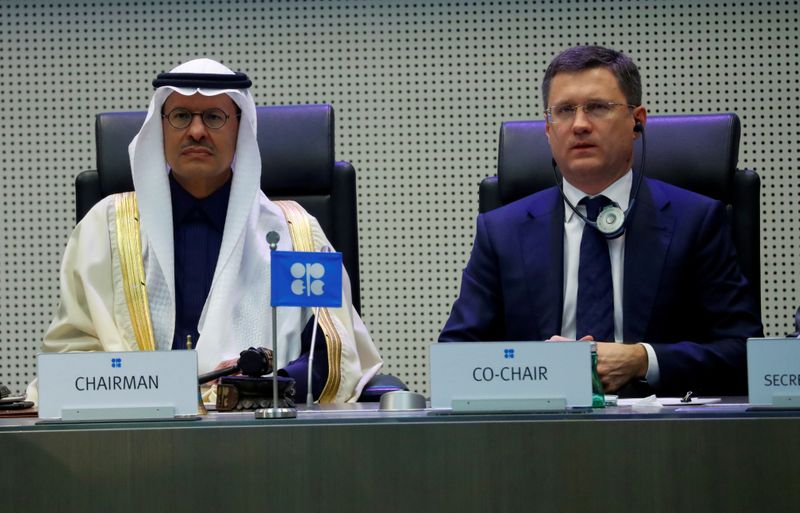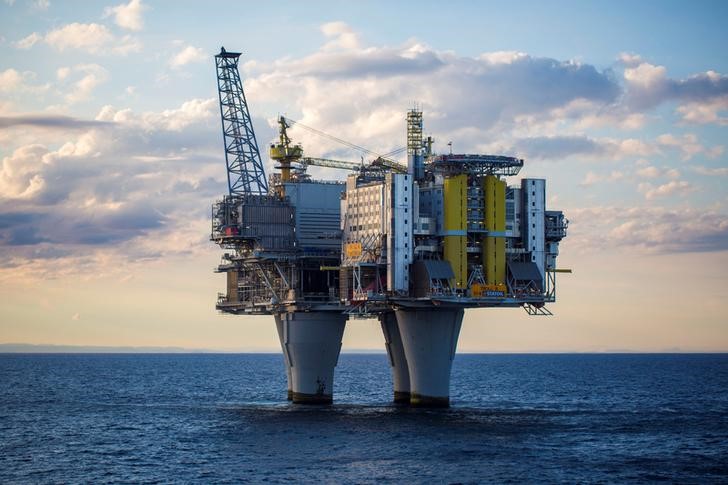By Rania El Gamal, Vladimir Soldatkin and Jeff Mason
DUBAI/MOSCOW/WASHINGTON (Reuters) - U.S. President Donald Trump said on Thursday he had brokered a deal with top crude producers Russia and Saudi Arabia to cut output and arrest an oil price rout amid the global coronavirus pandemic, though details of how cuts would work were unclear.
Trump said the two nations could cut output by 10 to 15 million barrels per day (bpd) - an unprecedented amount representing 10% to 15% of global supply, and one that would require the participation of nations outside of OPEC and its allies. He said he did not make any concessions to Saudi Arabia and Russia, such as agreeing to a U.S. domestic production cut - a move forbidden by U.S. antitrust legislation.
Russia and Saudi Arabia have been at odds since early March, when they failed to agree on a deal curbing output as the coronavirus spread around the globe. The pandemic has worsened since, freezing economic activity and sending oil prices into a tailspin as producers confronted the prospect of a dramatic fall in demand along with a flood of unwanted oil supply.
"It's a very needed and necessary step - nothing works at $20 oil. Physically, the tap has to get turned off," said Brian Williams (NYSE:WMB), partner at Carl Marks Advisors, a merchant banking firm.
Saudi Arabia, the de facto head of OPEC, called on Thursday for an emergency meeting of OPEC and non-OPEC oil producers, an informal grouping known as OPEC+, state media reported, saying it aimed to reach a fair agreement to stabilize oil markets. Trump is separately set to meet with U.S. oil industry executives on Friday.
Trump said he spoke with both Russian President Vladimir Putin and Saudi Crown Prince Mohammed bin Salman on Thursday. "I expect & hope that they will be cutting back approximately 10 Million Barrels, and maybe substantially more which, if it happens, will be GREAT for the oil & gas industry!" Trump wrote on Twitter.
"Trump's call to Putin has changed everything," one OPEC+ source said, adding that initial talk among the group was about how other large producers such as Canada and Brazil would need to join in any coordinated output cuts.
Jason Kenney, the premier of Alberta, Canada's primary oil-producing province, said on Thursday that Alberta was open to joining a production-cut deal, though he said, "It's the Saudis and the Russians here who are the problem." Canada produces roughly 4 million barrels of oil every day.
Global oil demand is expected to fall by about 30 million bpd in April, or about one-third of daily consumption. Some 3 billion people around the world have been put on lockdown to slow the spread of coronavirus, which has sickened 1 million people worldwide and killed nearly 50,000.
The immense decline in demand sent oil prices to their lowest levels since 2002, close to $20 per barrel, hitting budgets of oil-producing nations and dealing a huge blow to the U.S. shale oil industry, which cannot compete at low prices.
The downward pressure has been exacerbated by the battle for market share between Russia and Saudi Arabia. Russia rejected the Saudi proposal last month to take supply off the market in part because it has cut its own output for years while U.S. production grew to a record 13 million bpd, gobbling up market share.
Russian Energy Minister Alexander Novak said on Thursday that Moscow was no longer planning to raise output and was ready to cooperate with OPEC and other producers to stabilize the market.
It was not clear when Saudi Arabia's proposed emergency OPEC meeting could be held.
A meeting could represent a thaw in Saudi-Russia tensions. A senior Gulf source familiar with Saudi thinking told Reuters that Russia's opposition to its proposal to deepen output cuts was the cause of market turmoil.
At the time of the deal's collapse, OPEC and its allies were collectively cutting output by about 1.7 million bpd - making a 10-to-15 million-bpd cut a big hurdle unless it brought in other major producers.
The swift and aggressive Saudi response to the collapse of the OPEC+ deal shocked the oil industry. The kingdom slashed export prices, opened the taps to pump at maximum production and tried to sell cheaper oil to refiners that buy Russian crude.
OUTPUT CUTS
Major global producers have already scaled back production as fuel demand has dropped precipitously and storage is rapidly filling. Brazilian state-run oil producer Petrobras has already cut output by 200,000 barrels per day, about 6 percent of its output, in response to what its chief executive called the "worse oil industry crisis in 100 years."
U.S.-based Chevron Corp (N:CVX) and BP Plc (L:BP) recently said they would pump less oil from shale than previously targeted.
The free-fall in prices has spurred regulators in the U.S. state of Texas, the heart of the country's oil production, to consider regulating output for the first time in nearly 50 years, while producers in neighboring Oklahoma asked state regulators also to consider cuts Thursday.
Ryan Sitton, one of three elected oil-and-gas regulators in Texas, spoke with Russia's Novak about a cut of 10 million bpd in global supply. "This isn't good for anybody," Sitton told Reuters. "We're talking about a destabilization of the global energy market."
Brent oil prices rose 21% to $29.94 per barrel, having earlier risen to as high as $36.29. U.S. benchmark WTI crude settled up 25% to $25.32 a barrel.

Even with Thursday's surge, Brent is still less than half its $66 closing level at the end of 2019.
